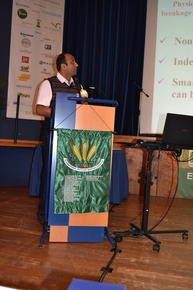October 2, 2014
Tiwari receives International Wheat Genome Sequencing Consortium Early Career Award

Vijay Tiwari, research associate in the Wheat Genetics Resource Center, received the International Wheat Genome Sequencing Consortium's Early Career Award at the consortium's conference in June.
The Early Career Award provides an opportunity for young and early career scientists to present their research at the world's biggest platform for the wheat genomics community. Since 2007, the consortium has included an early career speaker in all of its sponsored workshops. The goal is to engage young and early career scientists in wheat genomics broadly and in the consortium specifically.
"The consortium is an international platform of great repute for all wheat scientists throughout the world. To share my research findings and ideas with them as a young scientist definitely opened my horizons of knowing wheat and enabled me to think about new ways to contribute to the understanding and improvement of this important plant species," Tiwari said. "And of course, it's a great honor to be recognized by wheat community for new ideas or the small efforts that you are making in your area."
Tiwari completed his doctorate in wheat genomics from Indian Institute of Technology in Roorkee, India. After his doctorate, he joined Oregon State University as a postdoctoral scientist to work on radiation hybrid mapping in wheat. He recently joined the Wheat Genetics Resource Center in the plant pathology department at Kansas State University as a research scientist to work on wheat genomics.
His major research interest is genome analysis and gene mapping. Additionally, he is involved in projects related with alien chromosome specific and NGS-based sequence analysis of alien chromosomes.
In the future, Tiwari wants to work on ways to solve the complexity of the wheat genome, so that the commendable progress that is being made with huge amounts of sequence data can be utilized for purposes applicable to basic human needs.
